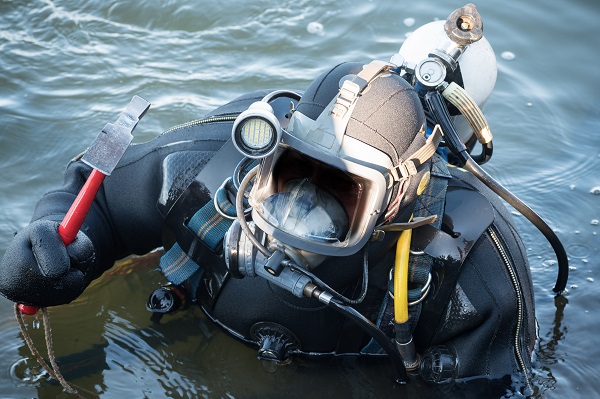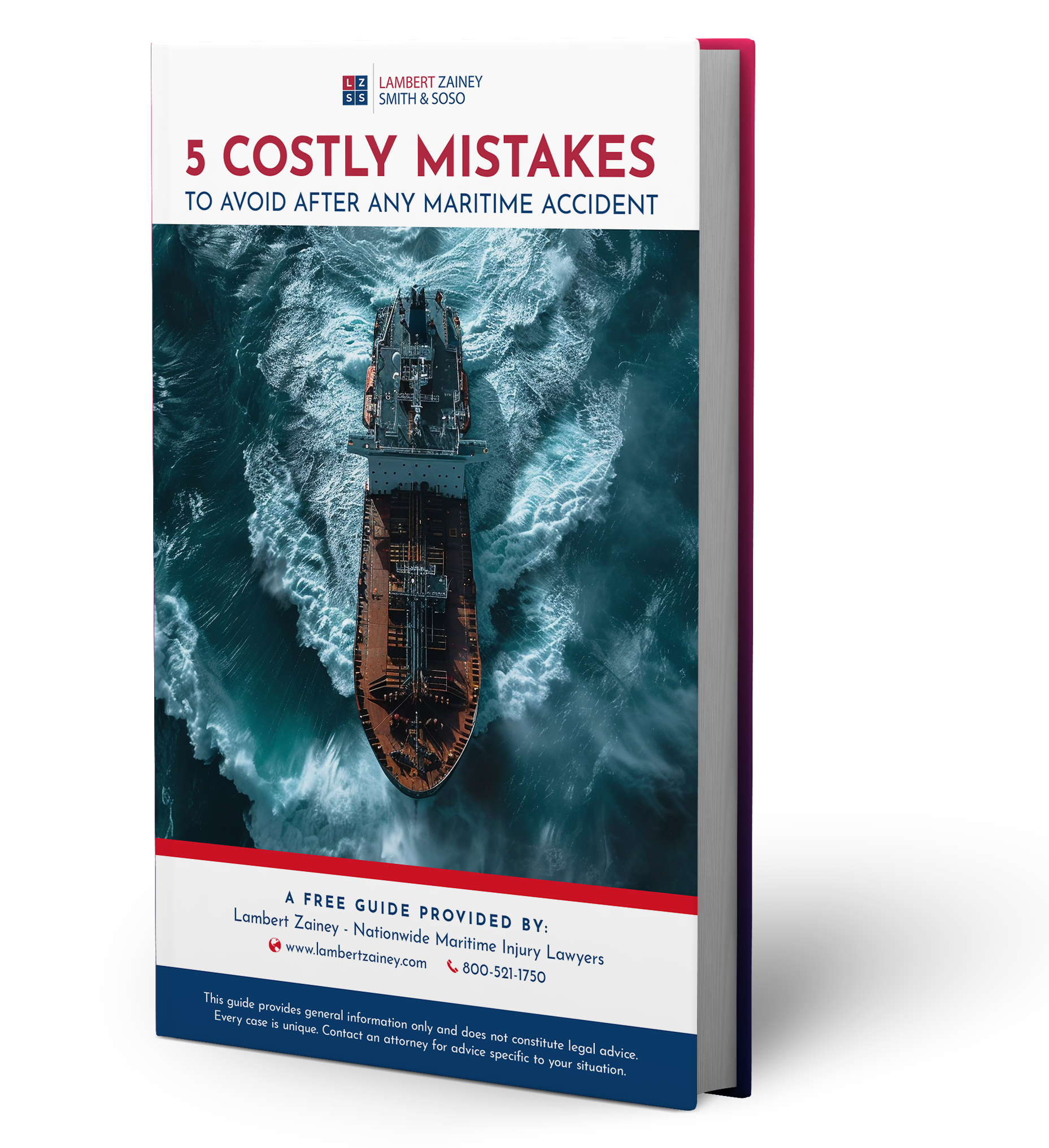All maritime workers face on-the-job hazards, but some maritime jobs — such as being a commercial diver — are riskier than others. Why do commercial diving accidents happen? And what rights do commercial divers have after they become injured and unable to work after a work accident?

What Do Commercial Divers Do?
As defined by the U.S. Bureau of Labor, a commercial diver is a maritime worker who works below the surface of water, using scuba gear and other underwater breathing apparatus (such as liveboating, where air is supplied to the diver from a surface source) to inspect, repair, remove, or install equipment and structures. Commercial divers use a variety of power and hand tools, such as drills, sledgehammers, torches, and welding equipment.
A list of commercial diving operations compiled by the Occupational Safety and Health Administration (OSHA) include:
Hazards Facing Professional Divers
The hazards professional commercial divers face while working underwater depends on a lot of factors, including the type of dive, the length of dive, the frequency of dive, water conditions and the type of operation being performed. Potential commercial diving related injuries include:
Preventing Commercial Diving Accidents
According to the CDC, the Bureau of Labor Statistics reported 460 nonfatal occupational injuries and illnesses among commercial divers involving days away from work and 39 fatal occupational injuries during 2011–2017. Here are a few of the common causes of commercial diving accidents:
Inexperience and Lack of Proper Training
It’s important for everyone involved in the dive to be properly trained to prevent avoidable mistakes. Commercial divers should always have the right certification to perform the particular tasks expected of them. Just because someone has an open water certification doesn’t make them qualified to perform underwater welding or other dangerous jobs.
All the workers on the dive teams should be aware of the physical hazards diving presents and should be trained to recognize and treat diving injuries (decompression illness, barotraumas, bad air mix, nitrogen narcosis, etc.) before they become life threatening.
Not Following Safety Procedures and Protocols
Because commercial divers work in a hostile, potentially dangerous environment, it’s important that all safety procedures and protocols are followed before, during, and after a dive. Drowning, decompression illness and barotrauma are a few of the injuries that can result when divers and their support crew fail to follow the proper safety procedures.
Defective Equipment
It’s important to test each piece of diving gear and equipment for defects and flaws. A malfunction caused by a manufacturer’s defect in an air tank or air tube could lead to a fatal underwater commercial diving accident.
All diving equipment — helmets, masks, tanks, octopus air hoses, buoyancy compensators, wet suits, dry suits, communication devices — should be tested before a diver gets into the water.
Poor maintenance
It’s important that all diving equipment be properly maintained to ensure safe operation and prevent underwater accidents.
Environmental Conditions
Cold deep waters, low to no visibility, dangerous currents and hostile marine life are just a few of the environmental hazards that could result in a commercial diving accident.
Get Our FREE Guide to Protect Your Claim
What you do after an accident is critical. Insurance companies will try to get you to make mistakes that can hurt your claim. Our free guide can help you avoid these traps.
Download our complimentary guide: “5 Costly Mistakes to Avoid After Any Maritime Accident” to arm yourself with the knowledge you need to protect your rights.
Your Rights after a Commercial Diving Accident
While commercial diving is a potentially dangerous profession, most commercial diving accidents can be prevented if divers and dive crews are properly trained and qualified, safety protocols are followed, and diving equipment is maintained.
If you are a commercial diver who has been injured in a maritime accident that was caused due to the negligence of a vessel’s owner, its crew, or a diving equipment manufacturer, the Jones Act and other maritime laws give you the same rights as other maritime workers to seek compensation for your damages.
Lambert Zainey is one of the nation’s premiere maritime injury law firms. We’ve been protecting the rights of commercial divers and other maritime workers since the 1970s. During that time we’ve obtained hundreds of millions of dollars in settlements for clients who have been injured in on the job maritime accidents that never should have happened.
Don’t put off seeking legal help for the pain and expenses caused by your injuries. Maritime injury claims are subject to statutes of limitation. Contact Lambert Zainey today to schedule a free consultation with one of our experienced commercial diving accident attorneys. The sooner we get to work on your case, the better your chances of securing the maximum award you are owed.
All maritime workers face on-the-job hazards, but some maritime jobs — such as being a commercial diver — are riskier than others. Why do commercial diving accidents happen? And what rights do commercial divers have after they become injured and unable to work after a work accident?

What Do Commercial Divers Do?
As defined by the U.S. Bureau of Labor, a commercial diver is a maritime worker who works below the surface of water, using scuba gear and other underwater breathing apparatus (such as liveboating, where air is supplied to the diver from a surface source) to inspect, repair, remove, or install equipment and structures. Commercial divers use a variety of power and hand tools, such as drills, sledgehammers, torches, and welding equipment.
A list of commercial diving operations compiled by the Occupational Safety and Health Administration (OSHA) include:
Hazards Facing Professional Divers
The hazards professional commercial divers face while working underwater depends on a lot of factors, including the type of dive, the length of dive, the frequency of dive, water conditions and the type of operation being performed. Potential commercial diving related injuries include:
Preventing Commercial Diving Accidents
According to the CDC, the Bureau of Labor Statistics reported 460 nonfatal occupational injuries and illnesses among commercial divers involving days away from work and 39 fatal occupational injuries during 2011–2017. Here are a few of the common causes of commercial diving accidents:
Inexperience and Lack of Proper Training
It’s important for everyone involved in the dive to be properly trained to prevent avoidable mistakes. Commercial divers should always have the right certification to perform the particular tasks expected of them. Just because someone has an open water certification doesn’t make them qualified to perform underwater welding or other dangerous jobs.
All the workers on the dive teams should be aware of the physical hazards diving presents and should be trained to recognize and treat diving injuries (decompression illness, barotraumas, bad air mix, nitrogen narcosis, etc.) before they become life threatening.
Not Following Safety Procedures and Protocols
Because commercial divers work in a hostile, potentially dangerous environment, it’s important that all safety procedures and protocols are followed before, during, and after a dive. Drowning, decompression illness and barotrauma are a few of the injuries that can result when divers and their support crew fail to follow the proper safety procedures.
Defective Equipment
It’s important to test each piece of diving gear and equipment for defects and flaws. A malfunction caused by a manufacturer’s defect in an air tank or air tube could lead to a fatal underwater commercial diving accident.
All diving equipment — helmets, masks, tanks, octopus air hoses, buoyancy compensators, wet suits, dry suits, communication devices — should be tested before a diver gets into the water.
Poor maintenance
It’s important that all diving equipment be properly maintained to ensure safe operation and prevent underwater accidents.
Environmental Conditions
Cold deep waters, low to no visibility, dangerous currents and hostile marine life are just a few of the environmental hazards that could result in a commercial diving accident.
Get Our FREE Guide to Protect Your Claim
What you do after an accident is critical. Insurance companies will try to get you to make mistakes that can hurt your claim. Our free guide can help you avoid these traps.
Download our complimentary guide: “5 Costly Mistakes to Avoid After Any Maritime Accident” to arm yourself with the knowledge you need to protect your rights.
Your Rights after a Commercial Diving Accident
While commercial diving is a potentially dangerous profession, most commercial diving accidents can be prevented if divers and dive crews are properly trained and qualified, safety protocols are followed, and diving equipment is maintained.
If you are a commercial diver who has been injured in a maritime accident that was caused due to the negligence of a vessel’s owner, its crew, or a diving equipment manufacturer, the Jones Act and other maritime laws give you the same rights as other maritime workers to seek compensation for your damages.
Lambert Zainey is one of the nation’s premiere maritime injury law firms. We’ve been protecting the rights of commercial divers and other maritime workers since the 1970s. During that time we’ve obtained hundreds of millions of dollars in settlements for clients who have been injured in on the job maritime accidents that never should have happened.
Don’t put off seeking legal help for the pain and expenses caused by your injuries. Maritime injury claims are subject to statutes of limitation. Contact Lambert Zainey today to schedule a free consultation with one of our experienced commercial diving accident attorneys. The sooner we get to work on your case, the better your chances of securing the maximum award you are owed.









